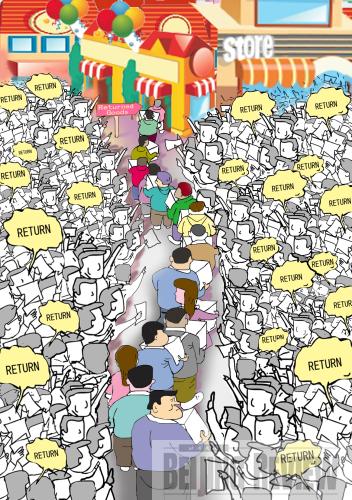|
 |
|
(LI SHIGONG) |
China's Law on the Protection of Consumer Rights and Interests, which has been in place for 15 years, will soon undergo a major amendment. According to Professor Liu Junhai at Beijing-based Renmin University of China, the scope of application of consumer rights will be further expanded to include both tangible and intangible goods. In addition, a "cooling-off period," during which consumers can change their minds, must be legalized.
Liu, also Deputy Director of the China Consumers' Association, said that the establishment of a "cooling-off period" must be provided for online transactions, prepaid items and other items involving a large expenditure such as cars and houses.
The "cooling-off period" in favor of comparatively ill-informed consumers was first coined in the commercialized U.S. market in an attempt to counter high-pressure sales tactics, particularly against door-to-door sales visits. Regulators in the United States have enacted that consumers may have a "cooling-off period" of seven working days in which they can cancel the sales contract and be fully refunded without penalty. Liu's new proposal to revise part of the long implemented consumer protection law has, however, sparked much debate.
Liu's supporters said that the legal basis of a "cooling-off period" lies in an inherent market deficiency, which leads to information asymmetry between vendors and consumers. A few of the former even boost sales through advertisement fraud. The "cooling-off period" will curb sales impetus and better protect consumers' rights.
Others argued that the new rule might increase unnecessary returns, causing losses to vendors and manufacturers. In addition, during a major slump in the property market, it is worrying that a "cooling-off period" may intensify market speculation by easier exchange or return of homes.
Consumer rights
Zhu Sibei (Shanxi Evening News): The protection of consumer rights is a social concern that needs to be addressed. If our consumers have to accept unfair contract terms or be deceived by falsified or low-quality products, their rights as consumers are greatly damaged.
While a "cooling-off period" may help change the situation by allowing consumers to try the performance of purchased items in a limited time, this will also potentially reduce unfair market competition. Thereby the stakeholders in the market, namely consumers and vendors, will benefit from the system.
Wang Chao (Luzhong Morning Post): The establishment of a "cooling-off period," during which consumers can make purchase returns without penalty, is aimed at resolving the long-existing information gap between vendors and consumers. It extends not only their right to know but also provides more buying options.
In a sound market environment, both sides are totally open to each other to maintain the transparency of trade, where consumers seldom feel regretful for their purchasing decisions. Even if few buyers spitefully seek refunds, it would not fundamentally undermine market rules.
But in reality consumers struggle to safeguard their rights, and it is definitely a more important issue to maintain market order through further legislation under the current legal framework, such as the introduction of a "cooling-off period" into the domestic market.
Feng Haining (Modern Express): The "cooling-off period" was introduced for the benefit of consumers, as it helps to keep sales legitimate. Big spending consumers will be greatly encouraged to buy, which will in turn boost market demand. On the other hand, dishonest vendors who break market rules will suffer from huge tangible or intangible losses from compensating consumers and rebuilding brand image. In this sense, the "cooling-off period" will have a positive impact on market players from both sides.
That is to say, the more rights consumers have, the better it is for market order. Most manufacturers and vendors will have to seek profits through quality improvement and streamline after-sales services, as well as enhance corporate credibility.
| 